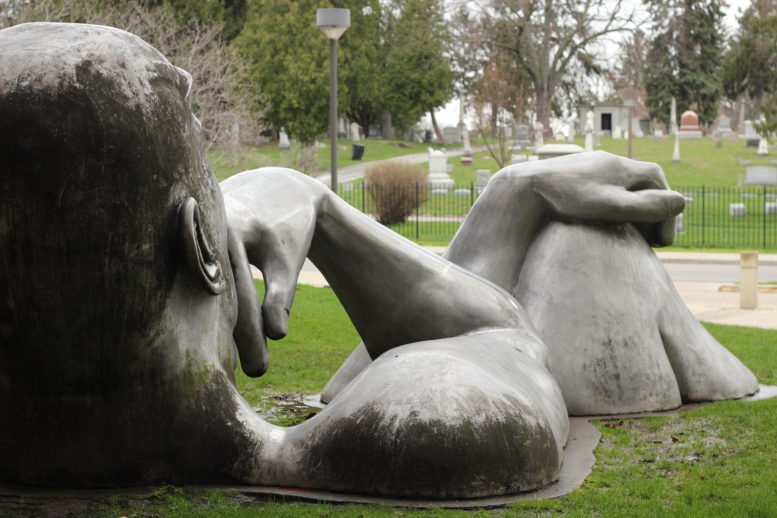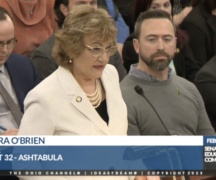The workforce and higher education committee heard more than seven hours of testimony on Senate Bill 83
BY MEGAN HENRY
Concerned college students, worried university staff, and outraged advocates packed the Ohio Statehouse Wednesday to speak against a massive higher education bill that would significantly change college campuses.
More than 500 people submitted opponent testimony to Senate Bill 83, which would, among other things, require American history courses and tenure evaluations based on if the educator showed bias or taught with bias, and prohibit university staff and employees from striking.
SB 83, which was introduced in March by state Sen. Jerry Cirino, R-Kirtland, would also ban programs with Chinese schools.
People testified for just over seven hours during Wednesday’s marathon Senate Workforce and Higher Education committee meeting. A little more than 100 people were actually able to testify in opposition before the meeting ended around 11:30 p.m.
SB 83 primarily affects public schools, but would mandate that private schools that want to use public funds sign paperwork saying they are following free speech guidelines.
There is also a companion bill, House Bill 151, that was introduced by state Rep. Steve Demetriou, R-Bainbridge Twp., and state Rep. Josh Williams, R-Oregon, on April 6.
Honesty for Ohio Education, a nonpartisan statewide coalition, hosted a press conference opposing SB 83 before Wednesday’s committee meeting.
“It is bad for students, it is bad for higher education, and it is bad for Ohio,” said Cynthia Peoples, the founding director of Honesty for Ohio Education. “This bill attacks academic freedom. It attacks our students’ freedom to learn.”
Ohio students
Students from various universities waited hours to testify Wednesday.
More than 100 students signed up to testify including at least 49 from Ohio State, 25 from the University of Miami, and 13 from Kent State University.
Emily Hill, a senior studying history at the University of Akron, is concerned the language of the bill could prevent history professors from having honest conversations with their students.
“Professors will be unable to discuss important historical events and issues for fear of being perceived as biased or making students uncomfortable,” she said. “History is uncomfortable.”
She fears shying away from those conversations will make students less empathetic and lack critical thinking skills.
Clovis Westlund, an Ohio State University student, said during Wednesday’s press conference he has seen so many students on campus outraged over SB 83 — ranging from activists, aspiring politicians and lawyers, future educators, student organization leaders, and future health care professionals.
“I’ve never seen a bill so universally despised,” he said. “All of these students fear SB 83 for its ambiguous language that endangers the education we invest so much time and money into.”
College students will look outside of Ohio if this bill passes, Westlund said.
“We will seek education elsewhere that affirms our identities, supports the communities built among marginalized students and adequately prepares us to enter a diverse workforce,” he said. “We will take our money out of Ohio universities, take our talent out of Ohio economies and take our energy out of Ohio communities.”
Ohio university main and regional campuses and community colleges have both seen a 12% decrease in enrollment from Fall 2022 to Fall 2012, according to the Ohio Department of Higher Education.
“Young people will suffer because of SB 83, but we will recover,” Westlund said. “Ohio, however, will not.”
Advocacy groups
SB 83 should be renamed the higher education destruction act, Pranav Jani, the president of Ohio State University’s chapter of American Association of University Professors (AAUP), said during the press conference.
“SB 83 promises a slide into an authoritative state that threatens freedom in higher education,” he said.“This is the real life thought police and Big Brother fictionalized in George Orwell’s 1984.”
He said SB 83 makes Ohio less competitive for attracting students and faculty.
“This reputation will threaten Ohio’s economic competitiveness,” Jani said. “It attempts to foster a climate of fear that would hold us back from having challenging discussions with students.”
Ohio Education Association and Ohio Federation of Teachers both testified against SB 83.
ACLU of Ohio
Sean McCann, policy strategist with ACLU of Ohio, said during the press conference there are a handful of issues that are alarming within SB 83.
“On the surface it prohibits segregation, which sounds good, but practically speaking SB 83 would be banning racial or ethnic student associations, single sex dormitories, looking at Greek Life particularly,” McCann said. “Not just fraternities and sororities but Black fraternities and sororities, which are critical institutions beyond college life.”
ACLU of Ohio is also concerned about how SB 83 would eliminate diversity, equity, and inclusion training.
“SB 83 would ban both proactive training and reactive training,” McCann said.
For example, he said it would ban a university police department from requiring mandatory training for police officers after noticing a pattern of racial bias.
Collective bargaining
Cirino, who also chairs the Senate’s Workforce and Higher Education Committee, said during Wednesday’s meeting university faculty going on strike “just seems to not be putting the students first.”
OEA President Scott DiMauro responded by saying the working conditions of university faculty often reflects the learning conditions of students.
“It’s in the interest of the greater good of the students,” DiMauro said. “While rare, (strikes are) one of those important provisions that needs to be maintained in law.”
Youngstown State University workers went on strike for a few days in 2020 over pay disputes, and faculty at Wright State University went on strike for almost three weeks in January 2019 over pay disputes and health care.
“The impact of SB 83 on collective bargaining is really an effort to take away the provision of a person to withhold their labor to obtain fair standards on the job,” Robert Davis, political and legislative director of AFSCME Ohio Council 8 said during the press conference.
Tenure
Under SB 83, colleges and universities would have until July 2024 to adhere to “post-tenure review policies” that start when tenured faculty receives “does not meet performance expectations” evaluations in the same category two years in a row.
Cirino reiterated Wednesday that SB 83 does not threaten tenure.
“What this does is simply say there should be a formalized review process,” Cirino said. “I happen to believe that tenure is important in the state of Ohio.”
Proponent testimony
Wednesday’s meeting started with a few people testifying in support of the bill, including state Rep. Williams, R-Oregon, who introduced the House companion bill.
“This legislation is needed to protect not only faculty but most importantly, students,” he said.
As an adjunct college professor at Adrian College and alum of University of Toledo Law, he said he has seen discrimination against faculty in hiring and disciplinary practice.
“By doing nothing to support intellectual diversity on campus, we tacitly support intellectual tyranny in our most prized institutions,” he said.
University of Cincinnati Professor John Paul Wright said it pains him to support the bill.
“It pains me to say that too many academic programs have openly embraced radical ideologies and indoctrinate their students, but they have and they do,” Wright said.
Five people spoke during proponent testimony during a previous committee meeting at the end of March.





